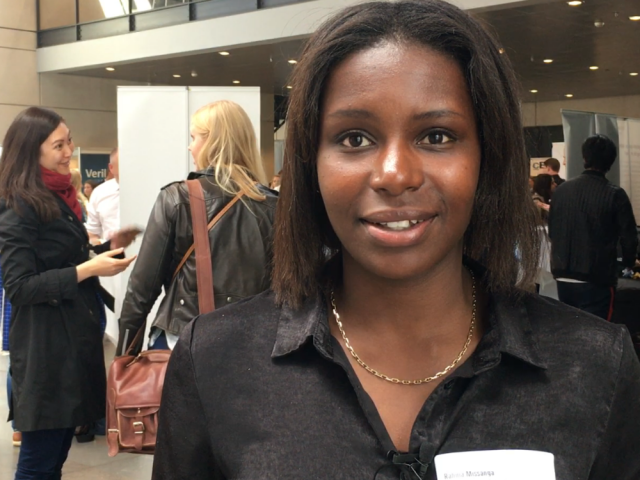The challenging mission

Researchers are not good enough at talking about stress, whereas Communications seem to handle stress rather well. What ever the case, we need to change how we talk about stress, CBS staff and postdoc both agree upon.
Talking about stress is the best way to battle it. This is the advice from CBS’ HR-services when asked how to battle the increasing stress related problems amongst CBS staff.
And it’s not enough to just talk about its existence. We need to talk about it in the right way, if it’s going to have an impact.
But this is easier said than done.
”Stress is very complex. We make different surveys among staff members and stress is generally in focus, but we don’t discuss it very often in the group of employee representatives,” says Ole Helmersen, Associate Professor at the Department of Management, Society and Communication and employee representative at CBS and continues:
“It’s difficult to talk about stress because it has a touch of taboo clinging to it. If a researcher is pressured due to work and eventually gets sick from the stress, it’s not always that the representatives would know about it and perhaps be able to help simply because it’s difficult to talk about,” he says.
Not knowing is the worst
Ole Helmersen says that researchers, compared to the administrative staff, have some greater issues talking about and even noticing if a colleague is battling stress, which is why it’s more important than ever to talk about it.
“Managers have a duty to pay attention to the various faculties’ work load, but we also have a duty to look out for each other and approach each other if we think someone is in the risk zone,” says Ole Helmersen.
Maybe we should start by changing the discourse from ’work-life balance’ to ‘life-work balance’.
Ole Helmersen, employee representative
He talks about a colleague of his, who got sick due to a longer period of feeling stressed, but he didn’t notice this before it was too late.
“As a researcher, you don’t necessarily belong to a specific group. You work in your office, do lecturers, work from home or are present at conferences. Researchers don’t spend an awful lot of time together compared to others. It can then be difficult to see, if someone is not feeling well or have changed,” he says.
Ole Helmersen is aware that most people who experience stress would rather keep it a secret instead of telling someone from work about it. But he stresses the importance of talking about it:
“Talking about it makes it so much easier to actually do something about it and help. And researchers are not good enough when it comes to spotting a colleague, who’s not feeling well, and then take action,” he says.
Communications gets help to prioritize their work
The Communications department has been unusually busy this year. CBS is celebrating its 100th year anniversary and this has put an increasing demand on tasks solved by the employees there. And it doesn’t seem to stop.
Because of this Janie Huus Tange, Head of Communications has in an agreement with her staff decided to hire a team of consultants to help prioritize assignments and improve the workflow.
”It’s more important than ever that we know how to prioritize our time and work. Otherwise, we will experience colleagues being sick from stress. And I don’t want that to happen,” says Janie Huus Tange.
We cannot expect that just talking about it will make it disappear.
Pernille Steen Pedersen, postdoc, CBS
Along with Ole Helmersen, she stresses the importance of talking about stress, and says that it’s the manager’s job to spot, if a colleague is showing signs of stress.
”It doesn’t require an exam in empathy to spot if a colleague is not feeling well or working way too much,” says Janie Huus Tange and adds:
”But if one of my colleagues became sick due to stress, I would, as a manager, feel guilty and ask myself if anything could be done to avoid it?,” she says.
In general she thinks her colleagues are good at talking about stress, but she argues that the way we use the word should be changed.
Stress means stress – not being busy
It’s not unusual to hear a colleague say: “I’m so stressed out because of this project,” or “I’m super stressed these days.” And it might be completely legal that employees are feeling stressed, but mostly they are actually ‘just’ busy, argues both Ole Helmersen and Janie Huus Tange.
”Earlier on, stress was a word used to describe, when people became sick, but now it’s a normal word to describe busyness,” says Ole Helmersen and adds:
“Maybe we should start by changing the discourse from ’work-life balance’ to ‘life-work balance’ to stress that people’s lives and health are more important than their work,” he says.

Janie Huus Tange hasn’t experienced being sick due to stress herself, but a good friend of her’s has and it did put things into perspective. The word stress got a whole other meaning to it.
”We have to be careful, when using the word stress. It doesn’t only mean that you are busy. Stress is used to describe the point, when you are no longer able to manage your work. Maybe we need to discuss what it means – the word has been misused for a long time,” says Janie Huus Tange and adds:
”Stress cannot be a self-fulfilling prophecy. But if you on the other hand are stressed, it is important to talk about it and reschedule some assignments and make work life a little easier.”
Talk is cheap
CBS staff is doing their best to talk about stress, but is it really the best way to get rid of it?
According to postdoc from CBS Pernille Steen Pedersen, who studies stress at workplaces, talking about stress might not be the best way to deal with it.
”It’s not everyone, who feels an urge to talk about stress, and it might not be the best way to deal with it. We need to have a much deeper understanding of the stress-related symptoms to deal with stress properly,” says Pernille Steen Pedersen.
She argues that stress today might be caused by different things compared to earlier times. Especially our expectations towards ourselves can cause stress. As she explains in the video below.
“Today we are stressed because of a huge gap between our ideals and our opportunities to fulfill the ideals. This, combined with the increasing expectations to ourselves, and what we think others expect from us, can lead to stress,” she says.
Pernille Steen Pedersen recently received funding to go in depth with stress reactions for the next two and half years, and by then she will hopefully know more about how to deal with stress reactions. But for now she argues that talking about it isn’t enough.
“We cannot expect that just talking about it will make it disappear.”
Read more:
More than every other CBS-student is stressed
Elite-culture spawns stress at CBS
How the Norwegian tv series SKAM can explain stress

































































































































Comments